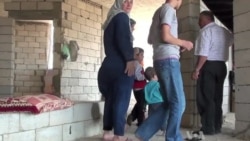BEKAA VALLEY, LEBANON —
The United Nations said more than two million people have now fled war in Syria. And as families await potential airstrikes from the United States, they are fleeing faster than ever.
At this center in eastern Lebanon, Syrian refugees wait as workers unload bread for distribution. Besam Kazah, who runs the center, said they depend almost entirely on private donations. As the war drags on, he said, donations are getting smaller while the refugee population is getting bigger.
“I feel sorry because, see, we have here very serious problems. Serious problems and nobody is taking care of them. For example we have a lot of women, a lot of them, and they don’t have any support,” said Kazah.
Down the road, five Syrian families have moved into an abandoned building.
The second floor is windy, with no windows or doors and the children play in rubble from fallen-down walls.
A woman, who fled Damascus, said the 16 children in the house are already cold. It is still summer in Lebanon.
She said her family left their home last month because she and her husband were afraid the children would be killed.
But the woman and her neighbors said they are also afraid the limited resources for refugees in this area will not be enough to go around if people keep coming.
Aid workers said newcomers have been pouring across the nearby border since U.S. President Barack Obama said he wants to send airstrikes to Syria to punish the regime for an alleged chemical weapons attack.
Khaled Roushdi is a businessman who has been going door to door finding out what families need, and trying to provide it. He says families often come with only the clothes on their backs and need everything else, like food, blankets and cooking gas.
The villages he works in, he said, already have more refugees than residents and they are coming faster than ever. He said if something doesn’t change, he doesn’t think aid workers will be able to keep up.
“That’s my fear," Roushdi said. "That’s my fear and we’re scared from that. So you help, you help, you help, you help. And after that, you cannot help.”
Khaled said officials have responded to the influx of refugees by refusing some people entry at the border for seemingly arbitrary reasons, like a tear in an identification card.
Refugees said they hope their relatives come soon before it gets even harder to cross. Ministers of Syria's neighbors officially promised this week they will not close their borders. But, along with the United Nations, they issued an urgent plea for more international help.
At this center in eastern Lebanon, Syrian refugees wait as workers unload bread for distribution. Besam Kazah, who runs the center, said they depend almost entirely on private donations. As the war drags on, he said, donations are getting smaller while the refugee population is getting bigger.
“I feel sorry because, see, we have here very serious problems. Serious problems and nobody is taking care of them. For example we have a lot of women, a lot of them, and they don’t have any support,” said Kazah.
Down the road, five Syrian families have moved into an abandoned building.
The second floor is windy, with no windows or doors and the children play in rubble from fallen-down walls.
A woman, who fled Damascus, said the 16 children in the house are already cold. It is still summer in Lebanon.
She said her family left their home last month because she and her husband were afraid the children would be killed.
But the woman and her neighbors said they are also afraid the limited resources for refugees in this area will not be enough to go around if people keep coming.
Aid workers said newcomers have been pouring across the nearby border since U.S. President Barack Obama said he wants to send airstrikes to Syria to punish the regime for an alleged chemical weapons attack.
Khaled Roushdi is a businessman who has been going door to door finding out what families need, and trying to provide it. He says families often come with only the clothes on their backs and need everything else, like food, blankets and cooking gas.
The villages he works in, he said, already have more refugees than residents and they are coming faster than ever. He said if something doesn’t change, he doesn’t think aid workers will be able to keep up.
“That’s my fear," Roushdi said. "That’s my fear and we’re scared from that. So you help, you help, you help, you help. And after that, you cannot help.”
Khaled said officials have responded to the influx of refugees by refusing some people entry at the border for seemingly arbitrary reasons, like a tear in an identification card.
Refugees said they hope their relatives come soon before it gets even harder to cross. Ministers of Syria's neighbors officially promised this week they will not close their borders. But, along with the United Nations, they issued an urgent plea for more international help.







